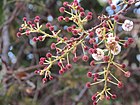Note: This is a project under development. The articles on this wiki are just being initiated and broadly incomplete. You can Help creating new pages.
Acacia concinna - Bahuphenarasa
Bahuphenarasa is a climbing shrub native to Asia, common in the warm plains of central and south India. It's fruit is known as shikakai in India. It is one of the good herbal remedies for hair.
Contents
Uses
Black fever, Malaria, Diabetes, Chronic cough, Asthmetic obstruction, Jaundice[1]
Parts Used
Chemical Composition
In commercial extracts, when the plant is hydrolyzed it yields lupeol, spinasterol, acacic acid, lactone, and the natural sugars glucose, arabinose and rhamnose. It also contains hexacosanol, spinasterone, oxalic acid, tartaric acid, citric acid, succinic acid, ascorbic acid, and the alkaloids calyctomine and nicotine.[2]
Common names
| Language | Common name |
|---|---|
| Kannada | Sige kayi, Sigeballi |
| Hindi | Kochi, Reetha |
| Malayalam | Cheeyakayi, Chinik-kaya, Shikai, Cheenikka |
| Tamil | Shika, Sheekay, Chikaikkai |
| Telugu | Cheekaya, Chikaya, Gogu |
| Marathi | NA |
| Gujarathi | NA |
| Punjabi | NA |
| Kashmiri | NA |
| Sanskrit | Aaavartaki |
| English | Shikakai, Soap-pod |
Habit
A large prickly climbing shrub
Identification
Leaf
| Kind | Shape | Feature |
|---|---|---|
| Bipinnate | Oblong | Pinnae 4-7 pairs, 4cm long; 20-25 pairs, 8 x 1.7mm |
Flower
| Type | Size | Color and composition | Stamen | More information |
|---|---|---|---|---|
| Bisexual | 1cm across | Cream or white | Many | Flower buds are purple or dark red, Plants flower January through April |
Fruit
| Type | Size | Mass | Appearance | Seeds | More information |
|---|---|---|---|---|---|
| A stout pod | 15 x 2.5cm | Fruit are on trees from February to March | The seedpods are widely used as a soap substitute in India | 10-14 seeds | {{{6}}} |
Other features
List of Ayurvedic medicine in which the herb is used
Where to get the saplings
Mode of Propagation
How to plant/cultivate
Acacia concinna can be grown from seeds. The seedlings can be transplanted. Seeds are pretreated by soaking in cold water overnight then sowed in polybag or beds.[5]
Commonly seen growing in areas
Photo Gallery
References
- ↑ 1.0 1.1 1.2 "Karnataka Medicinal Plants Volume - 2" by Dr.M. R. Gurudeva, Page No.704, Published by Divyachandra Prakashana, #45, Paapannana Tota, 1st Main road, Basaveshwara Nagara, Bengaluru.
- ↑ Wikipedea
- ↑ Herbarium JCB
- ↑ Herbarium JCB
- ↑ Cultivation details
External Links
- Ayurvedic Herbs known to be helpful to treat Black fever
- Ayurvedic Herbs known to be helpful to treat Malaria
- Ayurvedic Herbs known to be helpful to treat Diabetes
- Ayurvedic Herbs known to be helpful to treat Chronic cough
- Ayurvedic Herbs known to be helpful to treat Asthmetic obstruction
- Ayurvedic Herbs known to be helpful to treat Jaundice
- Herbs with Fruits used in medicine
- Herbs with Bark used in medicine
- Herbs with Leaves used in medicine
- Herbs with common name in Kannada
- Herbs with common name in Hindi
- Herbs with common name in Malayalam
- Herbs with common name in Tamil
- Herbs with common name in Telugu
- Herbs with common name in Sanskrit
- Herbs with common name in English
- Habit - A large prickly climbing shrub
- Index of Plants which can be propagated by Seeds
- Herbs that are commonly seen in the region of Tropical dry forests
- Herbs
- Climber
- Ayurvedic herbs that don't have seed photos
- Fabaceae







